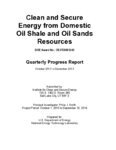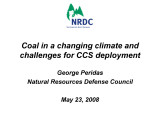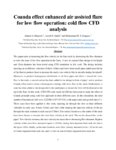TO
| Title | Date | Subject | Description | ||
|---|---|---|---|---|---|
| 326 |
 |
Clean and secure energy from domestic oil shale and oil sands resources: Quarterly progress report: October 2012 to December 2012 | 2013-01 | ICSE; Oil shale; oil sands; CO2 management; Uinta Basin; Liquid fuel production; In-situ thermal processing; White River oil shale; Green River Formation; American Shale Oil; AMSO; X-ray flourescence; Pyrolysis; Demineralized kerogen | The Clean and Secure Energy from Domestic Oil Shale and Oil Sands Resources program, part of the research agenda of the Institute for Clean and Secure Energy (ICSE) at the University of Utah, is focused on engineering, scientific, and legal research surrounding the development of these resources in ... |
| 327 |
 |
Clean and secure energy from domestic oil shale and oil sands resources: Quarterly progress report: October 2013 to December 2013 | 2014 | ICSE; Quarterly report; Clean and secure energy; Oil shale; Oil sands; Uinta Basin; CO2 management; AMSO; Greenhouse gas control; Shale formation; In situ; Ex situ; TEA-C | EXECUTIVE SUMMARY The Clean and Secure Energy from Domestic Oil Shale and Oil Sands Resources program, part of the research agenda of the Institute for Clean and Secure Energy (ICSE) at the University of Utah, is focused on engineering, scientific, and legal research surrounding the development of t... |
| 328 |
 |
Clean and secure energy from Utah's oil shale and oil sands resources: Environmental, legal and policy framework | 2010-04-28 | ICSE; Land use; Water availability; Produced water; Utah; Colorado; Colorado River | This poster addresses major challenges to land use, water availability, and produced water. |
| 329 |
 |
Clean coal program research activities: Final report: Reporting period 07/01/2006-05/31/2009 | 2010-05 | Environment; Emissions; NOx; SOx; Mercury emission; CO2 emissions; Utah Clean Coal Program; Carbon capture and sequestration; CCS; Green field plants; Simulation; Mergury control; Oxycoal combustion; Gasification; Sequestration; Chemical looping combustion; CLC; Materials investigations; NETL; Coal ... | Although remarkable progress has been made in developing technologies for the clean and efficient utilization of coal, the biggest challenge in the utilization of coal is still the protection of the environment. Specifically, electric utilities face increasingly stringent restriction on the emission... |
| 330 |
 |
Clearing the Path | 2018-01 | Student success; University of Utah | A strategic student success agenda. |
| 331 |
 |
Clearn combustion, a path to net zero | Use of fossil fuels as the major source of energy is one of the main sources of GHG emissions that contribute to global warming. However, for at least a foreseeable future, the world will still continue to rely on fossil fuels to sustain the economy and the quality of life. IEA is evaluating the pat... | ||
| 332 |
 |
Clearsign core process burners and boiler burners - burner scaling and field results | 2022 | During previous AFRC Industrial Combustion Symposia, ClearSign Technologies Corporation introduced its ClearSign Core technology currently used in our Ultra Low NOx burner products. These ClearSign Core products have now been developed for different types of equipment applications to meet stringent ... | |
| 333 |
 |
ClearSign eye™: pilot sensor | Clearsign Technologies Corp. has developed and tested a novel, capacitive based flame sensor for use on existing burners in a variety of industrial combustion applications including process burners, boiler burners and flares. ClearSign has developed two probe designs. The first probe design is compa... | ||
| 334 |
 |
Climate change 2007: The physical science basis--summary for policymakers | 2007-02 | Climate change; Greenhouse gases; Aerosols; Solar radiation; Radiative forcing; Third Assessment Report; TAR; Solar activity; Carbon dioxide; CO2; Methane; CH4; Nitrous oxide; N2O; Fossil Fuel; Land use; Agriculture; Land surface properties; Warming; Melting of snow and ice; Rising seal level; Globa... | The Working Group I contribution to the IPCC Fourth Assessment Report describes progress in understanding of the human and natural drivers of climate change1, observed climate change, climate processes and attribution, and estimates of projected future climate change. It builds upon past IPCC assess... |
| 335 |
 |
Climate change regulation via the back door | 2011-05-17 | ||
| 336 |
 |
Climate change--current understanding and implications | 2008-05-23 | Global warming; Climate change; Coal; CO2; Carbon dioxide; Temperature; Radiative Forcing; Emissions; Greenhouse gases; Arctic warming; Sea level rise; Fossil fuel; Renewable | Four Primary Questions: 1-Is global warming (climate change) occurring? 2-What is the cause? 3-What will be the consequences? 4-What can/should we do? |
| 337 |
 |
Closed loop flare control using a video imaging spectral radiometer | Video Imaging Spectral Radiometry (VISR) has emerged as the only practical method to directly and continuously monitor flare performance. The VISR method provides real time measurements of flare combustion efficiency (%) and a smoke index (0-10) at a 1-sec temporal resolution. In addition to these t... | ||
| 338 |
 |
Co-simulation for design and optimization of advanced energy systems with carbon capture | 2009-10 | NETL; APECS; IGCC; U.S. Energy challenges; Design and optimization of advanced energy systems; CFD; Reduced Order Models; ROMs; Carbon capture; Virtual power plant; Carbon management; Fossil Energy Industry; Ultra-supercritical; USC; Oxy-combustion; Chemical looping combustion; CLC; Integrated gasif... | Outline of Presentation: 1-Introduction: -U.S. Energy Challenges -Design and Optimization of Advanced Energy Systems; Simulation Tools and Challenges 2-Advanced Process Engineering Co-Simulation (APECS): -Basic Features; Process/CFD Workflow/Integration, Engineering Knowledge Manager(Trademark), Red... |
| 339 |
 |
CO2 capture from fossil energy power plants | 2008-05-23 | CO2 capture; Fossil energy power plants; Clean Coal Technologies; CCT; CO2 Capture and Storage; CCS; Coal power plants; PC plants; Post combustion CO2 removal; Chilled ammonia; Retrofit of CCS to existing coal plants; Climate Legislation; Global climate concerns | Clean Coal Technologies (CCT) and CO2 Capture and Storage (CCS) - Presentation Outline: 1-Overview--Options for Response to Global Climate concerns. 2-CCS crucial to meet Goals of proposed Climate Legislation. 3-CCS Options for Coal Power Plants. 4-PC Post Combustion CO2 Removal-Status, Chilled Ammo... |
| 340 |
 |
Coal devolatilization at very slow heating rates | 2007 | coal devolatilization ; slow heating rates; volatiles; coal; devolatilization temperatures; volatile yeilds; atmospheric gases | The yield of volatiles of liquid and gaseous species is a function of operational conditions, including effects of reactor atmosphere gases, coal ranks, heating rates, ultimate devolatilization temperatures, pressure, soak time at ultimate temperatures, and catalysts. One important factor of coal de... |
| 341 |
 |
Coal in a changing climate and challenges for CCS deployment | 2008-05-23 | NRDC; Climate change; Coal; CCS deployment; CCS; Carbon Capture and Storage; Business-as-usual; BAU; world CO2 emissions; coal plant emissions; Appalachia; Wyoming; Montana; North Dakota; Colorado; New Mexico; IPCC; Powerplants; Arctic ice | Outline: 1-Climate and coal 2-"Clean" coal? 3-Carbon Capture & Storage: can we (just) do it? 4-To-do list 5-A changing world |
| 342 |
 |
Coanda effect enhanced air assisted flare for low flow operation: cold flow CFD analysis | This paper aims at increasing the flow velocity in the flare stack by decreasing the flow diameter to solve the issue of low flow operation in the flares. A new air assisted flare design of 1m height and 15cm diameter has been tested using CFD simulation in this work. The design includes injecting a... | ||
| 343 |
 |
Coking contaminated oil shale or tar sand oil on retorted solid fines | 1985-03-26 | Patent; Heavy oil; Oil shale; Tar sand oil; Coking; Pyrolysis oil vapors; Retorted solid fines; Pyrolysis oil; Inert stripping gas; Coking contaminated | Heavy oil fraction of pyrolysis oil vapors containing concentrated contaminants is coked on retorted fine solids contained in a coking zone separate from a retorting vessel characterized by the presence of an inert stripping gas of a rate sufficient to lower the dew point of the pyrolysis oil. |
| 344 |
 |
Coking poor coking coals and hydrocracked tar sand bitumen binder | 1980-11-18 | A process is described for producing metallurgical coke from poor coking coals in which there is combined with the poor coking coals a small amount of an additive consisting of a bitumen residue obtained from hydrocracking of bitumen from tar sands. The residue used is that from vacuum distillation ... | |
| 345 |
 |
Colleges, Schools & Divisions | The colleges, schools, and divisions within the University of Utah. | ||
| 346 |
 |
Colorful Gilson did more than promote gilsonite | 1996-03 | The following article from The Times-Independent in Moab pays tribute to the man for whom Gilsonite is named. Utah's American Gilsonite Company traces its roots to Sam Gilson. | |
| 347 |
 |
Combination solvent-noncondensible gas injection method for recovering petroleum from viscous petroleum-containing formations including tar sand deposits | 1978-08-29 | Patent; Petroleum; Tar sand deposits; Petroleum recovery; Viscous petroleum-containing formations; Gas injection; Unreactive; Combination solvent-noncondensible gas injection method; Bitumen | Petroleum may be recovered from viscous petroleum-containing formations including tar sand deposits by injecting into the formation a solvent which is liquid at formation conditions and simultaneously therewith injecting a substance which will remain totally gaseous at the pressure and temperature c... |
| 348 |
 |
Combined surface and in situ tar sand bitumen production | 1985-02-19 | Patent; Combined surface and in situ tar sand bitumen product; In-situ combustion; Tar sand; Unminable tar sand formation; Hydrogen sulfide; H2S; Minable tar; Forward in-situ combustion; Reverse in-situ combustion | In-situ combustion of tar sand formations is improved by introducing into an unminable tar sand formation prior to initiation of in-situ combustion hydrogen sulfide produced from upgrading tar sands from a minable tar sand formation in an area proximate the area of the unminable formation. The strea... |
| 349 |
 |
Combustion emissions and thermal performance impacts when replacing hydrocarbon fuels with hydrogen in industrial furnaces | Many industrial processes rely on heating that is currently achieved through combustion of fossil fuels. The industrial sector generates approximately 23 percent of the greenhouse gas emissions in the US. As infrastructure associated with production and distribution of hydrogen continues to expand, ... | ||
| 350 |
 |
Combustion of municipal solid wastes with oil shale in a circulating fluidized bed | 1996-06-30 | The authors of this report have invented an integrated process for the treatment of municipal solid waste (MSW). In this process, after recycling steps to save usable materials such as aluminum, other metals, and glass have been completed, the resulting refusederived fuel (RDF) is co-combusted with ... |
